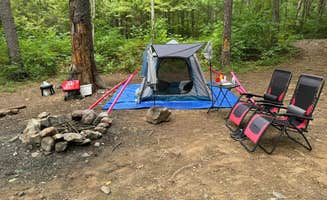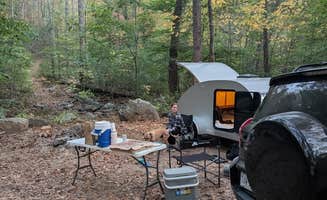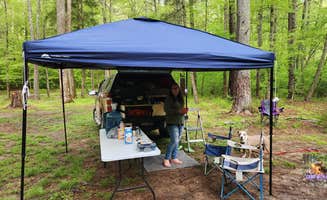Dispersed camping areas in George Washington National Forest near Moneta, Virginia provide primitive camping opportunities within a varied terrain of hardwood forests and mountain streams. Most sites sit at elevations between 1,500-2,500 feet where summer temperatures average 75-85°F during day and 55-65°F at night. Fall camping season extends well into November with reduced humidity and temperatures in the 40-60°F range.
What to do
Creek exploration: Multiple dispersed sites along FR 812 feature easy creek access, perfect for wading, fishing, or collecting water for filtration. "There's access to the App Trail on the road so you might see some hikers but it was real quiet otherwise. Pretty nice scenery (you're smack in the middle of the forest) so if you want to get away from people this is a great site," notes a camper at George Washington National Forest off 812.
Summit hiking: A trail at the end of FR 812 leads to panoramic views and connects to the Appalachian Trail. "There is a hike at the end of the road that takes you to a gorgeous summit & links to AT!" reports a visitor to Dispersed Camping Site off FR 812.
Bouldering routes: McAfee Knob area offers challenging bouldering opportunities for climbers. A visitor to Johns Spring Shelter shares: "Another cool thing about this area is that there's some fairly nice bouldering to be found near the top. Some of the routes are a little under maintained and mossy, but there are some fun ones."
What campers like
Stone fire rings: Many primitive sites near Moneta feature established stone fire circles, some with additional cooking features. "There was a fire ring and man made stone oven at the site we chose," mentions a camper at Reservoir Road Dispersed Campsite.
Multiple site options: FR 812 corridor has numerous camping spots with varying degrees of privacy and access. "We came for this site specifically but it was already occupied so we kept going down the road. Luckily there were 4-5 additional site & we got one for 3 nights. They are all lovely & creekside with fire pits," reports a happy camper.
Solitude factor: Many visitors appreciate the quiet, remote nature of these camping areas. "Stayed 5-5-25. It was clean, creek for water if you have filter. Nice fire ring and wood. Did not see another person," writes a camper about their experience in the national forest.
What you should know
Arrival timing: Competition for prime spots increases on weekends and during peak seasons. "Multiple road sites that fit my van with room to spare - 80% were full on a beautiful fall Friday evening around 6pm but still snagged one," notes one visitor.
Road conditions: Access routes vary from moderate to challenging, especially during or after rain. "It is a very rocky path, about 50 feet long, to get into the campground, but then it is smooth and well laid out," explains a camper about one particular site.
Communications: Cell service is virtually nonexistent at most primitive camping areas near Moneta. "No cell service (T-Mobile), but if I drove towards the main road, Route 501, I could get some service," reports one camper.
Tips for camping with families
Group site options: Some dispersed areas can accommodate multiple tents or family groups. "There is a giant fire circle in the middle and enough room to fit about 10 vehicles/groups if people don't mind being next to each other," notes a visitor to a camping area off FR 812.
Shelters vs. tent camping: For families hiking sections of the AT, shelters offer an alternative to tent camping. "There is also a wooden shelter maintained by the AT, but those aren't my favorite to sleep in. Seemed nice as far as they go though," shares one hiker.
Water planning: No reliable water sources exist at some sites, requiring advance planning. "There is not a water source too close to the shelter. The closest one is about 3 miles North," warns a hiker about Johns Spring Shelter.
Tips from RVers
Site accessibility: Most dispersed camping areas near Moneta have limited RV access with few suitable for anything beyond small campervans. "Went in August and it was very buggy, also had someone park pretty close which when I drive down a really long dirt road that is questionable for my van, I want it to be private," shares an RV camper.
Parking constraints: Many primitive sites have limited parking areas that may not accommodate larger rigs. "Large open space with several flat areas for tents. There are several spots on this road, maybe 6 but this is the furthest off the road," explains a camper about site dimensions.
Road length considerations: Some access roads extend several miles on rough terrain. "This was about 5 miles of dirt road to get to it," notes a van camper about one particular site, indicating the need to plan fuel usage and time accordingly.





